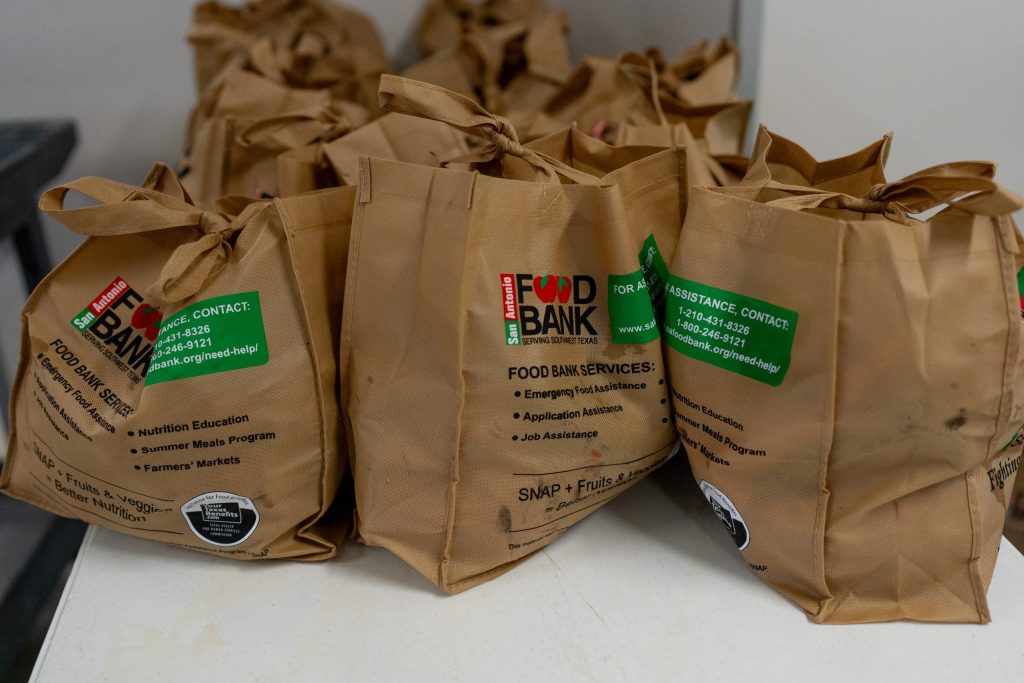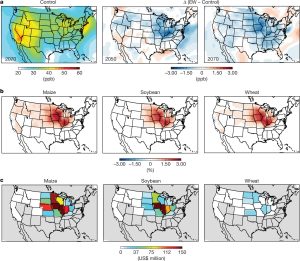Partner agencies combating local food insecurity, especially among college students, recently got help in the form of a $1.25 million gift from local philanthropist Harvey Najim.
Officials from the Najim Charitable Foundation, San Antonio Food Bank and the University of Texas at San Antonio gathered at the main UTSA campus last week to announce the gift. According to a press release, $125,000 will be donated to the food bank every year for 10 years.
The food bank provides millions of pounds of food to more than 500 charitable organizations around Southwest Texas, including UTSA, University of the Incarnate Word, Alamo Colleges District and Baptist University of the Americas. Students at those campuses can access food at an on-site pantry or a pop-up market.
Najim and Eric Cooper, the food bank’s president and CEO, said having access to affordable food should not be a barrier to pursuing a quality college education.
“I know the food bank will maximize my impact with their efficiencies which will in turn create a learning environment where all UTSA students have enough food to thrive and graduate,” Najim said in the release.
The U.S. Department of Agriculture defines food insecurity as a lack of consistent access to enough food for every person in a household to live an active, healthy life.
Food insecurity among students
According to the 2021 Feeding America’s Map the Meal Gap study, 20% to 50% of U.S. college students experience food insecurity — higher than the 10.4% food insecurity rate for the general population.
The same study shows that rates of food insecurity are highest among students identifying as African American or Black (58%) and students identifying as American Indian or Alaskan Native (59%).
UTSA opened the Roadrunner Pantry in March 2017 at its main campus and the downtown campus pantry in February 2020. Any UTSA student with a valid UTSA ID can visit the pantry and shop for free.
Both UTSA Roadrunner Pantries collectively average 200 visits daily and 20,000 visits annually, university officials said.
LaTonya Robinson, UTSA’s senior vice provost for student affairs, said access to staple foods such as bread, cereal, fruits and vegetables is important.
“With those foods, students are better able to concentrate on their studies,” Robinson said.
Aydan Villarreal, UTSA Student Government Association president, said in the press release he was grateful for Najim’s gift.
“This gift will meet a real challenge facing college students all over the country,” Villarreal said. “It’s going to lift students out of hunger and tackle a problem that I hope we can work together to eliminate.”
College food pantries
Texas A&M University-San Antonio runs a pantry, The General’s Store, that’s open to TAMUSA students, faculty and staff with a valid university ID.
According to Clarissa Tejeda, director of employer relations and community outreach at TAMUSA, the university opened the pantry in response to food insecurity in the surrounding community.
In 2024, the pantry at TAMUSA saw about 2,000 visits, which translates to 10,000 pounds of food provided there free of charge last year. Additionally, the food bank offers a free monthly course on nutrition.
Tejeda said providing basic food helps students in their path toward academic success.
“Students also get experiential lessons by volunteering there,” Tejeda said.
UIW’s pantry, Cardinals’ Cupboard, opened in 2018 to UIW students, faculty, staff and community members.
Ricardo Gonzalez, director of UIW’s Ettling Center for Civic Leadership and Sustainability, said their pantry saw 768 visitors over the fall 2024 semester.
“Food insecurity has grown over the last few years. At some point in recent years, food insecurity affected 30% to 40% of our student body,” Gonzalez said.
Gonzalez said UIW’s pantry can help nourish students physically and mentally.
“If there’s a roof over their head and their stomach is filled with food, they can study,” he added.
Nearly 78,000 pounds of food have been provided to 20,000 students at 66 pop-up food distribution markets at five Alamo Colleges District campuses and the Eastside Education and Training Center since the food bank began partnering with the community college district.
Leticia Duncan-Brosnan, director of the district’s Student Advocacy Network, said many community college students nationwide face food insecurity.
“Beyond food distribution, our Advocacy Centers also offer access to benefits navigators, who assist eligible students with the Supplemental Nutrition Assistance Program application process and give them access to much-needed food resources,” she added.








